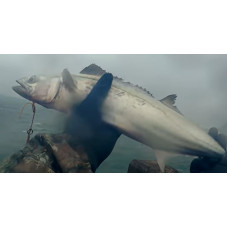Latin name
Scomberomorus niphonius
Other names
Japanese seer fish
Identification
Japanese Spanish mackerel have a spindle-shaped body, compressed at the sides. The swim bladder is absent. The length of the snout is shorter than the rest of the head. Canines and palatines are present. The maxilla is not hidden under the premaxilla. The 2 dorsal fins are separated by a small gap. The lateral line is not wavy, but curves sharply under the second dorsal fin. Teeth on the tongue are absent. Number of gill rays on first gill arch 11-15. Vertebrae 48-50. The only species in the genus with a direct intestine.
Features of fish fins
The pelvic fins are small. The ventral process between them is small and forked. The first dorsal fin has 19-21 barbed rays, the second dorsal fin 15-19 and the anal fin 16-20 soft rays. Behind the second dorsal and anal fins are a number of smaller fins (6-9 and 7-9 respectively) which help to avoid vortex formation during rapid movement. The pectoral fins are made up of 21-23 rays.
Fish colouring
Back greyish blue. Sides and abdomen greyish steel, with 7 or more longitudinal rows of small spots along the sides.
Distribution
Occurs in subtropical and temperate waters of the Pacific Ocean south of Hokkaido Island (off China, Hong Kong, Korea and Taiwan). In Russian waters it is found in Peter the Great Bay.
Habitat
Pelagic, neritic, oceanodromous, gregarious fish. Mainly found in coastal waters at depths of up to 200m.
Size
The maximum recorded length is 1 m and the mass is 7.1 kg.
Behavior
Spawn in March-June and arrive at their feeding grounds in September-November.
Food and feeding habits
The diet of this predator is based on small pelagic fish (anchovy, mackerel, saira), squid and cuttlefish.
Reproduction
Spawn in coastal areas in April-May. The eggs are pelagic. Fecundity reaches 550-570 thousand eggs. Males and females reach sexual maturity at a body length to tail fork of 40 cm and 60 cm respectively. Life expectancy is estimated to be 6 years. Generation length is approximately 2-3 years.
Fishing
A valuable commercial fish, especially in Japan. Nets are the main fishing gear used.
Relationship with a person
Has high quality white meat.
| Classification | |
| Phylum | Chordata |
| Class | Actinopterygii |
| Squad | Scombriformes |
| Family | Scombridae |
| Genus | Scomberomorus |
| Species | S. niphonius |
| Features | |
| Conservation status | Data Deficient |
| Habitat | Pelagic |
| Life span, years | 6 |
| Maximum body weight, kg | 7,1 |
| Maximum length, cm | 100 |
| Sailing speed, m/s | No information |
| Threat to people | Edible |
| Way of eating | Predator |

